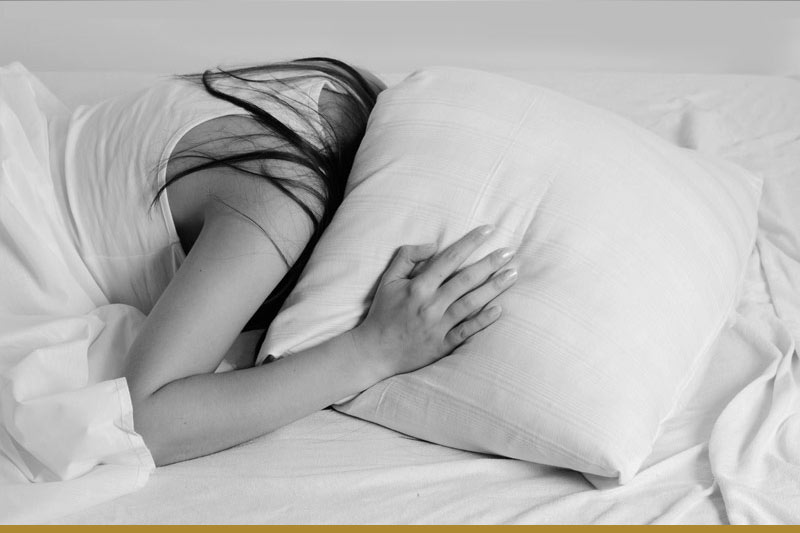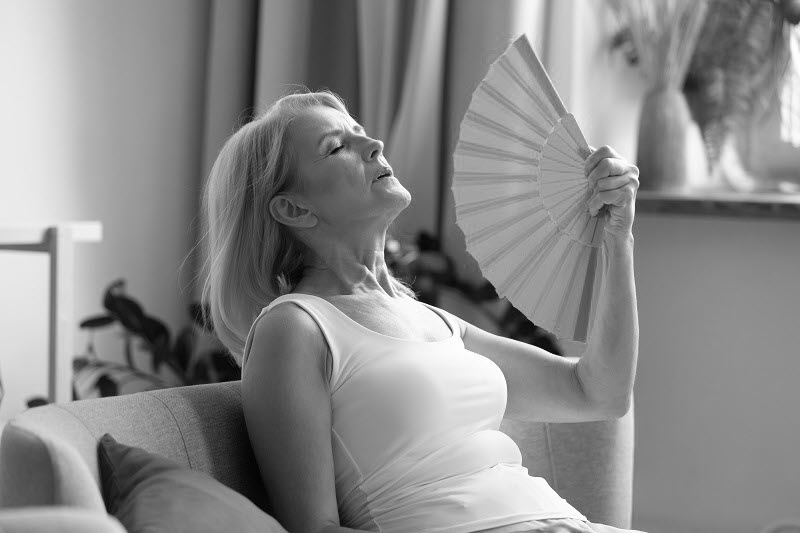Menopause is a significant turning point in a woman’s life and is characterized by an absence of menstrual bleeding. It is preceded by a period of several years, during which a series of symptoms affect a woman’s physical and emotional state. This transitional phase before menopause is called perimenopause.
In this article, we explain what perimenopause is, how long it lasts, and which treatments can alleviate the most unpleasant symptoms.

Perimenopause is a natural process that occurs in the years before menopause and is marked by changes in a woman’s menstrual cycle and hormonal levels, especially estrogen. These changes are manifested in a series of physical and emotional symptoms. During this phase, the functioning of the ovaries declines, periods become erratic, and chances of conception are lowered.
Women usually enter perimenopause around the age of 45. In rare cases, women experience the first symptoms in their mid-30s, while some not until their 50s.
Perimenopause usually lasts four years but can stretch to ten years for some women. When a woman does not have a period for 12 consecutive months, she has entered menopause.

Perimenopause symptoms are different for each woman, but most experience a combination of these conditions:
Most perimenopause symptoms appear because of the decrease in estrogen production caused by the declining ovarian function. This hormonal imbalance is responsible for hot flashes, vaginal dryness, bone loss, mood swings, and other uncomfortable symptoms.
Some lifestyle and medical factors can increase the chance of entering perimenopause earlier in life.
Note: Read our article, and learn the differences between perimenopause and premenopause.

Some women struggle with their perimenopause symptoms. Fortunately, there are treatments that help you go through this challenging period.
1. Hormone Replacement Therapy
Many women who enter perimenopause seek hormone replacement therapy to stabilize estrogen levels and relieve the symptoms caused by low estrogen. At Vibrant Vitality Clinic, we provide Female Hormone Replacement Therapy to help address the issues that arise during perimenopause and help patients smoothly transition to menopause.
2. Medication for Hot Flashes
The FDA has approved a low-dose form of paroxetine (an antidepressant) to treat hot flashes. Other antidepressants also help alleviate these symptoms (venlafaxine, citalopram, escitalopram).
3. Antidepressants for Mood Swings
A doctor can prescribe antidepressants if mood changes interfere with your daily functioning.
4. Vaginal Creams
Prescription or OTC vaginal creams can help reduce vaginal dryness and pain during sex caused by decreasing estrogen.
5. Diet Change
In many cases, a simple diet change can help alleviate perimenopause symptoms. Doctors recommend eating mostly fruits, vegetables, and grains, and eliminating foods high in sugar and unhealthy fats.
6. Calcium Supplements
Women in perimenopause who experience bone thinning need 1000-1200 mg of calcium per day taken through food or supplements. Medical providers also recommend 400-600 IU of vitamin D for better calcium absorption.
7. Regular Exercise
Health professionals recommend regular exercise for disease prevention to everyone, including women in perimenopause. Exercise helps maintain optimal weight and triggers the happiness hormone, helping to improve mood, sleep patterns, and overall wellbeing.
Common perimenopause symptoms are not a cause for concern. It is important to maintain regular check-ups with your gynecologist to keep track of any changes in your health and wellbeing.
If perimenopause symptoms cause pain, discomfort, or heavy bleeding, you should seek medical help. The medical provider will perform a blood test to ensure you have entered perimenopause and recommend proper treatment.
Conditions that require medical help include:
Though sometimes uncomfortable, perimenopause is a natural process that can’t be avoided. The best way to go through perimenopause is to be informed about the symptoms and the treatments and lifestyle changes that help mitigate the most unpleasant effects. This knowledge will facilitate a smoother transition to the next chapter in your life.




4325 E Indian School Rd, Suite 130
Phoenix, AZ 85018
United States
(480) 422-2058
info@vibrantvitalityclinic.com
Monday - Friday: 9:00 am - 6:00 pm
Saturday: 9:00 am - 3:00 pm
Sunday: Closed
